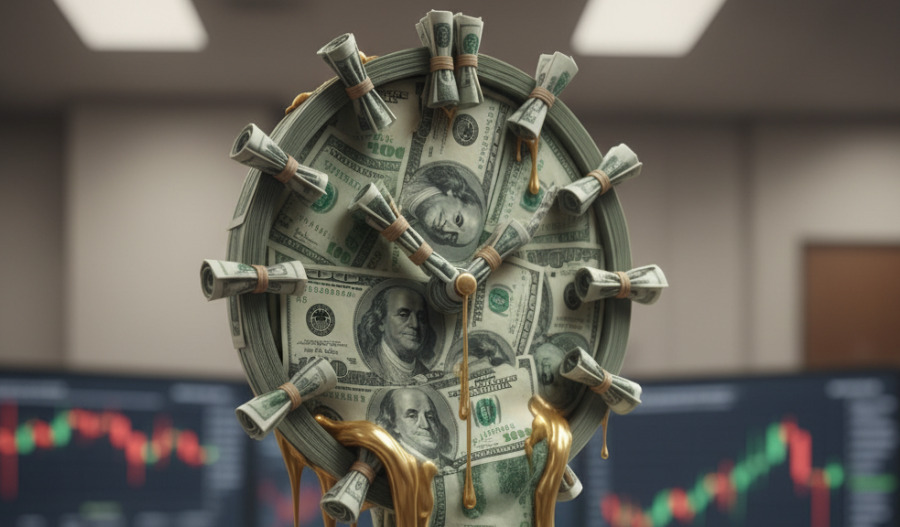It was a week where the world's largest economy couldn't keep the lights on yet again, AI companies burned through billions while everyone applauded - yet again, and copper finally made Washington's critical minerals shortlist. The world witnessed the longest government shutdown ever grinding into its sixth week and a US$38 billion OpenAI deal with Amazon, as the markets priced in growth and priced out reality.
For Australian investors, the week served as another reminder that local markets rarely move in isolation - what happens in Washington and Silicon Valley has a nasty habit of showing up in ASX price movements and RBA policy decisions weeks later.
All the top moves, shakes, and borderline absurdities from Azzet's editorial team are right here in your weekly business wrap every Friday (7 November, 2025).
Dysfunction turns policy
The United States officially entered its longest shutdown ever on Wednesday, surpassing 36 days and breaking the previous record set in 2019.
Both records now belong to the Trump administration, which is either impressive consistency or concerning incompetence depending on your politics.
The stalemate centres on Affordable Care Act subsidies, with Republicans pushing temporary funding at current levels while Democrats demand additional healthcare appropriations.
This marks the 14th failed Senate vote during the closure.
The timing couldn't be worse for economic data - the Bureau of Labor Statistics suspended official releases, leaving markets to rely on alternative metrics that paint an increasingly grim picture.
Private data from Challenger, Gray & Christmas revealed U.S. employers announced 153,074 job cuts in October - a 175% surge from a year earlier and the highest monthly total in over two decades.
The Congressional Budget Office estimates 750,000 federal workers were furloughed, representing 0.4% of the civilian labour force.
"Some industries are correcting after the hiring boom of the pandemic, but this comes as AI adoption, softening consumer and corporate spending, and rising costs drive belt-tightening," said Andy Challenger, chief revenue officer at the outplacement firm.
The Chicago Fed's alternative unemployment estimate climbed to 4.4% in October, the highest since October 2021.
Job openings on Indeed hit their lowest level in almost five years, while ADP reported private payrolls of 42,000 - well above expectations.
The Trump administration was ordered to fully fund SNAP by Friday, compounding an already dysfunctional federal apparatus.
Meanwhile, government-related flight cuts created havoc for travellers as airlines urged Congress to pay air traffic controllers.
If nothing else, watching investors shrug off 153,000 job cuts and a 36-day government impasse while bidding up equities suggests the market has perfected selective amnesia.
The AI spending spree continues
While Washington fumbled with basic governance, Silicon Valley doubled down on artificial intelligence with deals that would make even a Saudi sovereign wealth fund blush.
Amazon secured a seven-year, $38 billion agreement to provide cloud services to OpenAI through its AWS unit, giving the ChatGPT developer access to hundreds of thousands of Nvidia GPUs.
The deal pushed Amazon shares to a record high of $258.60, valuing it at $2.71 trillion.
Not to be outdone, Lambda secured a multibillion-dollar contract with Microsoft to deploy tens of thousands of Nvidia GB300 NVL72 systems - the chipmaker's newest rack-scale architecture.
The San Francisco startup positions itself as "The Superintelligence Cloud," which is either visionary branding or tech hubris at its finest.
Palantir shares hit a record on an AI-fuelled earnings beat, proving that surveillance capitalism with a fresh coat of AI paint still sells.
The infrastructure arms race shows no signs of slowing, with the U.S. government potentially taking a major nuclear stake under Trump to power the data centres required for this AI boom.
Washington can't keep its own doors open for six weeks, but it's perfectly happy to sign off on $38 billion deals for companies burning billions in operating losses.
Markets have developed a remarkable talent for celebrating profligacy while ignoring the bits that don't fit the narrative.
Critical minerals finally get critical treatment
In what might be the week's most significant policy shift, the U.S. added copper, silver, uranium, metallurgical coal, and potash to its critical minerals roster.
The U.S. Geological Survey expanded the list to 60 commodities following a comprehensive risk assessment spanning 402 industries.
Minerals-based industries contributed over $4 trillion to the economy in 2024.
Want to be kept up to date about all things critical minerals? Check out the latest edition of our weekly Mission Critical column.
Washington's acknowledgement that copper and silver might be critical to national security arrives roughly a century after most mining companies figured this out, but better late than never.
Copper's designation is particularly significant for stalled domestic projects like Resolution Copper in Arizona - a Rio Tinto and BHP joint venture that could satisfy 25% of U.S. copper demand but has been mired in a decade-long approvals battle with Native American groups who consider the Oak Flat site sacred.
Freeport-McMoRan noted it could generate over $500 million annually in tax credits under the Inflation Reduction Act with copper's new status.
For ASX-listed mining behemoths Rio and BHP, the designation transforms Resolution Copper from a decade-long approvals headache into a strategically vital asset backed by federal incentives.
Washington's policy shift just made their Arizona copper project considerably more bankable - a reminder that U.S. regulatory decisions have a direct line to Australian mining companies' balance sheets.
The broader implications extend beyond copper and across the Pacific.
Australian rare earths processors, lithium producers, and mineral sands operations suddenly find themselves sitting on even more resources that Washington now considers critical to national security.
That translates to streamlined approvals, tax incentives, and purchasing agreements that will flow through to quarterly earnings reports from the Pilbara to Port Hedland.
Whether the ‘critical’ designation translates to actual mines or just more feasibility studies and environmental assessments remains the billion-dollar question.
Uranium's return to America's critical minerals list reflects Washington's renewed focus on nuclear energy as a secure, carbon-free baseload power source - and growing concerns over reliance on Russian imports.
Silver's inclusion recognises its role in solar photovoltaic cells and advanced electronics, where demand is rapidly outpacing global mine supply.
Speaking of China, the week brought detailed terms of the U.S.-China trade truce signed by Trump and Xi Jinping in South Korea.
Beijing committed to lifting export restrictions on critical minerals, ceasing fentanyl chemical exports to North America, and resuming the flow of key auto semiconductors from Nexperia's Chinese facilities.
China also agreed to buy 12Mt of U.S. soybeans in the last two months of 2025 and 25 Mt over each of the following three years - around previous levels before Beijing stopped purchases earlier this year.
The timing aligns with the Middle Kingdom's decision to ease critical minerals export restrictions as part of the broader trade truce, though our Mission Critical column warned this could create a false sense of security about supply chains.
Beijing's willingness to turn the taps on and off at will hasn't changed - it's just currently in their interest to turn them on.
Trade wars and temporary truces
The DXY hit a 13-week high as Fed hawks pushed back on rate cut expectations, even as China reduced tariffs on some U.S. goods.
However, the legality of Trump's global tariffs came under scrutiny, and tariffs and inflation pushed U.S. retail prices up.
Trump also threatened military action in Nigeria and called for stronger military ties with Vietnam - trade policy and military posturing now operate on the same playbook.
The truce offers temporary relief, but mistaking eased export restrictions for genuine supply chain security is a rookie error.
Central banks hold their ground
Australia's central bank kept interest rates steady following the Melbourne Cup public holiday, with Governor Michele Bullock warning that fewer rate cuts are possible in this cycle.
The decision came despite housing value growth reaching its fastest pace in over two years and electricity costs powering Australian inflation's increase.
The RBA initially signalled no Cup Day cut amid rising inflation concerns.
Meanwhile, OPEC halted 2026 output hikes amid oversupply concerns, throwing another wrench into the inflation forecast.
Central banks holding rates steady while warning about sticky inflation is either prudent caution or an admission they've run out of conventional tools.
Take your pick.
Q3 earnings season's winners and losers
The quarterly reporting season delivered its usual mix of triumph and disaster.
Nintendo raised forecasts on the back of the Switch 2, while gaming and data centre sales drove AMD's Q3 earnings beat.
Qualcomm's chipset growth drove an earnings beat, and Snap's stock soared on a revenue beat and Perplexity deal.
On the positive side, production growth offset crude slump at Exxon and Chevron, operating earnings soared for Berkshire Hathaway's Q3, and Expedia topped forecasts with B2B growth, gaining 14.7%.
Ralph Lauren raised guidance amid positive results, News Corp landed above revenue projections for Q1, investors gave Airbnb's Q3 result a positive review, and REA Group posted positive earnings as house values grow.
The losers list was equally notable.
NAB's stock fell after missing earnings estimates, Toyota profits slid 19% as tariff costs overwhelmed gains, and McDonald's sales growth missed estimates in Q3.
E.l.f. Beauty sales rose, but the stock tanked on weak guidance, Pinterest equities posted their second-worst day following earnings, and the Ozempic giant lowered its outlook amid price struggles.
Uber's counter dropped as its Q4 forecast missed expectations, Spotify topped Q3 forecasts but slipped 2% on mixed guidance, and Block fell short of projections despite profit growth.
First Guaranty slipped to a loss on auto parts lease setback, and Macquarie Bank paper tumbled despite a rise in profit.
The difference between winners and losers increasingly comes down to operational discipline rather than expansion-at-any-cost narratives that stopped working about three years ago.
Corporate moves and market shakes
Netflix eyed a bid for Warner Bros Discovery's studio unit, and Kimberly-Clark and Kenvue agreed to a landmark merger.
Microsoft will expand its workforce again, CEO Nadella said, bucking the broader trend of tech layoffs.
Ripple hit a $40 billion valuation after a $500 million investment from traditional finance giants, including Fortress and Citadel Securities - particularly notable given Citadel founder Ken Griffin's historical crypto scepticism.
Beta Technologies closed 6% up on its NYSE debut, while Zohran Mamdani will be the next mayor of NYC following his election victory.
Product safety dominated consumer headlines.
Over 300,000 Jeep hybrids were recalled for fire danger, over 800,000 Peloton bikes were recalled due to safety issues, and Microsoft apologised and refunded overcharged customers.
U.S. EV sales collapsed once federal tax credits expired - turns out consumer demand for electric vehicles was substantially tax-credit-shaped.
Snap is to be partially reinstated, though heavy delays are expected.
Market warnings and investment shifts
Wall Street bankers warned about market valuations, though timing market corrections has historically been as reliable as weather forecasting.
Small caps offer a compelling value and growth case, analysts argued, while hedge funds shouldn't be overlooked within idiosyncratic markets.
The IMF's global growth warning prompted questions about whether it could turn into reality, and the FS Power50 listed Australia's top financial advisers.
Consumer Watch saw CBA top Choice's 2025 Shonky Awards - presumably not an award they'll feature prominently in marketing materials.
See you next week.



